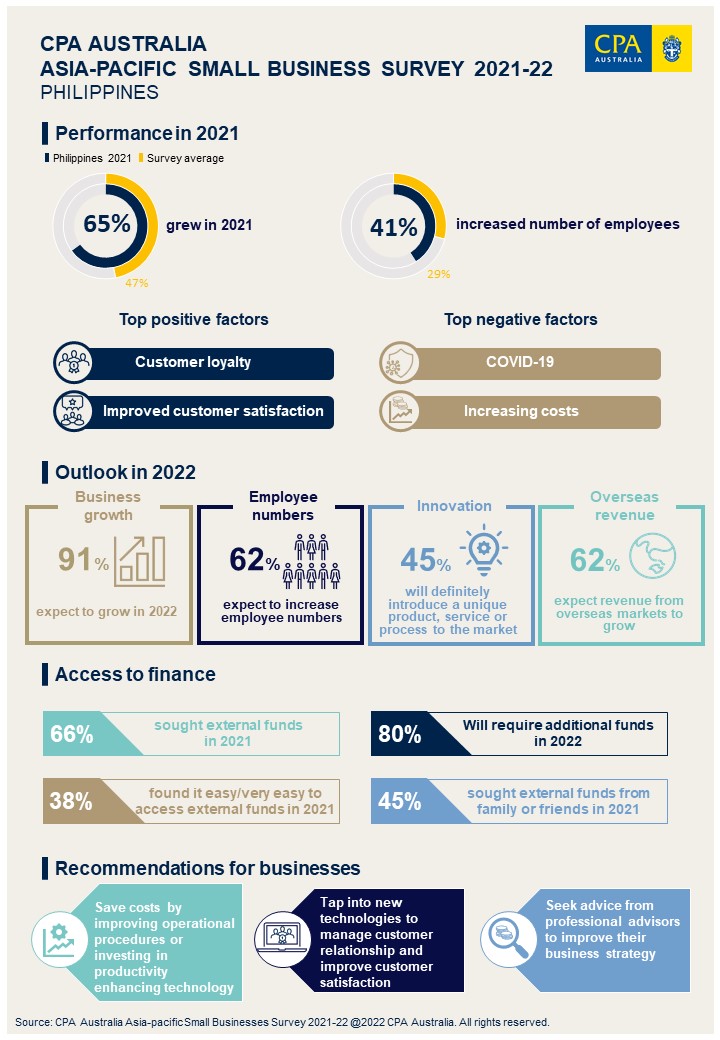Filipino small businesses bullish about 2022
Content Summary
Riding high after a strong recovery from COVID-19 last year, Filipino small businesses are the most bullish in the Asia-Pacific about their growth prospects in 2022, according to CPA Australia’s annual Asia-Pacific Small Business Survey.
One of the world’s largest accounting bodies, CPA Australia, surveyed 4,252 small business owners or senior managers from November to December 2021. The survey was undertaken in 11 Asia-Pacific markets and included 302 Filipino small businesses. The survey sought to understand small business conditions, challenges and confidence.
Though COVID-19 continued to adversely impact Filipino small businesses last year, 65 per cent of respondents reported growing and 41 per cent increased employee numbers. Both results were the second highest among all the markets surveyed.
Filipino small businesses’ relatively strong 2021 is likely rooted in strong customer satisfaction and business strategy. Over the past three years, respondents nominated customer loyalty and improved customer satisfaction as the top factors positively influencing their businesses.
Mr Leslie Leow, General Manager – Emerging Markets, CPA Australia said, “To stand out from competitors and win more customers, it’s pivotal for micro, small and medium-sized enterprises (MSMEs) to adopt a customer-oriented strategy. This will assist them provide the products or services customers’ demand.
“Filipino small business owners are typically young, vibrant and skilful at using digital technologies in their business and to engage with customers and potential customers.”
Filipino small businesses are the most optimistic about their growth outlook this year of the markets surveyed. Ninety-one per cent expect to grow, far outstripping the survey average of 62 per cent. Forty-five per cent stated they will introduce a new product, service or process to the market in 2022, while 62 per cent expect to hire more employees. Both results are the second highest among all surveyed markets. In addition, 62 per cent of respondents expect revenue from overseas markets to grow, outperforming the region.
Leow said “The Philippines are investing resources in revitalising industries hard-hit by COVID-19, such as tourism and hospitality. With border restrictions set to relax this year, foreign tourists and opportunities from overseas markets should spur MSMEs’ confidence and expansion prospects.
“One factor that is probably driving strong export growth expectations is the Philippines growing outsourced service centres. These centres are attractive to foreign companies, many of whom are seeking to overcome labour shortages and find efficiencies. Such interest is creating opportunities for many local MSMEs.”
Aside from the pandemic, “increasing costs” remains the biggest barrier to Filipino small businesses. Materials costs (42 per cent) and utility costs (39 per cent) were the costs that caused the most detriment.
Sixty-six per cent of respondents sought external funds last year while 80 per cent expect that they will require additional funds this year. Covering increasing expenses was one of the major reasons for seeking finance.
Financing conditions improved significantly for Filipino businesses in 2021. Thirty-eight per cent of respondents found access to finance “easy” or “very easy”, up from 13 per cent in 2020. However, this result is still below the survey average of 46 per cent.
Leow said, “Easier access to finance is most likely due to the strong shift by local businesses to family or friends as their main source of finance, which was up from 21 per cent in 2020 to 45 per cent in 2021. The survey shows that family and friends are typically the easiest source for finance to access.”
“While the Department of Trade and Industry Philippines released a total of PHP5.9 billion this year to MSMEs, funding roadblocks are still hindering local MSME’s growth.

“For those small businesses that can access external finance, we encourage them to seek professional advice before making a commitment, especially where the funding is to be used for short-term growth. Professional advisers can help such businesses determine whether taking on such debt is a wise decision. They may also be able to find other more effective ways to fund business expansion such as through internally-generated finance from improved efficiency.”
CPA Australia recommends Filipino small businesses consider the following actions:
- save costs by improving operational procedures or investing in productivity enhancing technology
- tap into new technologies to manage customer relationships and improve customer satisfaction
- seek advice from professional advisors to improve their business strategy.
About CPA Australia
CPA Australia is one of the largest professional accounting bodies in the world, with more than 170,000 members in over 100 countries and regions. Our core services include education, training, technical support and advocacy. CPA Australia provides thought leadership on local, national and international issues affecting the accounting profession and public interest. We engage with governments, regulators and industries to advocate policies that stimulate sustainable economic growth and have positive business and public outcomes. Find out more at cpaaustralia.com.au
Media contact: Serene Su, Mobile: +65 8181 3806 or email: [email protected]
Discover more
Hongyu Feng
- Media
WA Member Snapshot - Abhi Singh CPA
In this initiative, we meet West Australian members and gain insights into their sector and their role. This month, we chat to Abhi Singh CPA from the Curtin University School of Accounting, Economics and Finance.
- Media
Member access onlyColin Mackenzie
- Media
Paul Leroy
- Media
VIC Division Transcript 25 Sept 24
- Media
CPA Australia Podcasts
CPA Australia podcasts provide commentary and thought leadership across business, finance and accounting.
- Media